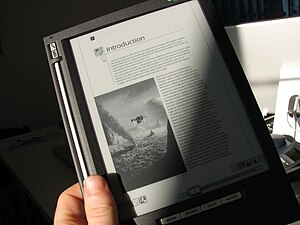It seemed simple and it seemed logical. It has turned out to be neither.
So begins a strongly argued and extremely readable post by Mike Shatzkin entitled, “From where I sit, you can’t actually buy an e-book.” What Shatzkin is referring to is the analogy between physical books and e-books. Making that analogy in the early days of e-book retailing seemed simple and logical. However, as Shatzkin argues, you can’t actually sell an e-book because e-books aren’t physical goods. Instead, what you’re selling is a license. And because it’s a license, restrictions on lending and sharing make sense, even if consumers still play by the analogy.
You certainly can sell e-book readers which, because they’re physical, can be given away and shared. After all, if you loan your reader to someone or give it away, you don’t have it anymore.
Certain DRM solutions like Amazon’s lending feature do take the analogy of physical books a bit farther. If you loan a book to someone via the Kindle, you don’t have it for the two weeks it’s on your friend’s Kindle. But there are deeper commercial questions at play here, many of which bear on the contracts executed years ago between publishers and authors — contracts that didn’t contemplate the existence of a robust e-book marketplace.
As Shatzkin outlines, from the author’s perspective, redefining e-books as licensed instead of sold has major implications on potential royalties. Royalties from sales are traditionally 25%, while licensing revenues are usually split 50/50. From the publisher’s perspective, eliding the definition of “sale” allows them to ignore their non-compete clauses with authors who choose to self-publish their own e-book versions. Both sides aren’t willing to go to the “nuclear option” of bringing the other to court. It would be expensive and excruciating for everyone involved, and nobody wants to be out in front.
However, as one critic of the post notes, consumers aren’t going to be impressed with all this “inside baseball” stuff. If a license takes away a book without warning, the vendor will come under fire, just as Amazon did when it revoked unlicensed copies of “1984” a few years ago.
So while this gentleman’s agreement seems to be stable for the moment, the perceptual and financial liabilities remain. As Shatzkin puts it:
. . . someday somebody who is not an agent trying to keep things sweet with publisher customers will file a lawsuit to make the case that ebook sales are licenses already covered in just about every publishing contract. That would suggest a potential liability equal to half the ebook revenue minus what has been paid so far on every ebook ever sold under any contract where that kind of rights split language still governs.
Publishers may want to evaluate their potential contractual exposure based on the assumption that e-book “sales” will someday be found to be licenses. And they may want to start messaging to their customers that what they’re buying is a license. Because one of the most effective and painless ways to signal the difference will be through lower prices for e-books, there is another shift in revenues to factor into future business planning, as well.
Apple’s recent announcement about a subscription service on its platforms seems to acknowledge this difference, something relevant to journal publishers. In the announcement, circuitous language is used to describe what Apple is providing — e.g., publishers “use” Apple’s subscription service, are “acquiring digital customers,” and both Apple and publishers “bring a new subscriber.” Only when the publisher is mentioned is the word “sell” used in their press release. Apple’s avoidance of the term seems to indicate they know they’re not selling, but licensing.
The digital revenue world continues to hold surprises. Or, as Shatzkin puts it:
It seemed simple and it seemed logical. It has turned out to be neither.
Discussion
25 Thoughts on "Can You Actually "Sell" an E-book? How You Answer Affects Your Revenue Assumptions"
Don’t most modern contracts also include “electronic” rights for distribution and other such formats? Wouldn’t this negate the licensing rights? Though I suppose that the electronic distribution rights should spell out the royalty rate and I’m willing to bet that many publishers’ contracts don’t get that specific. Without a specific rate given, one could argue that yes, I’ve granted you the electronic rights but those fall under licensing as opposed to being spelled out as something specific and other.
Also, aren’t e-books already less expensive than their paper counterparts? Hasn’t this already been done to balance out the (in many ways) inferior nature of what the customer receives?
Book contracts are different from serials contracts. Book contracts almost always differentiate between subsidiary rights licenses and outright sales. Shatzkin is correct on all points, including the possibility of litigation surfacing at some point.
I understand that, but in all the current book contracts that I’ve seen, the publisher specifically asks for electronic publication rights (as many publishers realized that they hadn’t secured these rights for their backlist). Perhaps this portion of the contract that secures those rights should clearly define the payment rate for that type of publication.
Yes, publishers now explicitly get electronic rights, but they have to pay a subsidiary rights royalty if they don’t market the book themselves. If you sell a print book to Barnes & Noble, you pay the royalty for a sale. When you license an ebook to barnesandnoble.com, you are engaged in a subsidiary rights license and hence the other royalty schedule applies. This is not a print vs. electronics matter, but a question of whether the digital sale is made directly by the publisher (almost never) or by a licensed third party.
As I said, I understand Shatzkin’s original point and why this would fall under licensing rather than sales. What I’m suggesting is that in the clause where electronic rights are granted, the contract could instead spell out specific terms and payment rates for this sort of transaction, rather than leaving it open to being interpreted as a licensing deal and falling under the specific terms (50:50 split) imposed for that type of transaction.
“However, as Shatzkin argues, you can’t actually sell an e-book because e-books aren’t physical goods.” I think this is a flawed premise. Lots of things are ‘sold’ that are not physical goods, even in the pre-digital world services, ideas, space were non-tangible things that could be bought or sold. I don’t think it’s a solid premise on which to base the argument that e-books can’t be bought or sold, only licensed.
Seconded. E-books most certainly _can_ be “sold” – I give you money, you give me a file. The fact that the files are more easily exchanged and copied, once purchased, than a physical object, does not mean that they cannot be treated the same way for the purposes of commercial transactions.
And just to be clear, this is not a hypothetical argument. I have purchased quite a bit of content this way. Most recently, last week I gave Radiohead $9.99 in exchange for an MP3 file of their latest album.
This is incorrect. Let’s run an experiment to prove it. You purchased an MP3 file from Radiohead. You now put it on a publicly accessible Web server and invite people to download the file. You sell ads on your site. Your site is now responsible for hundreds of thousands of downloads. Will you or will you not hear from Radiohead’s lawyers? If you “own” the file, the lawyers won’t bother you. If you own a *copy* of the file, they will bother you. I think you own a copy, not the copyright. But try it. I won’t. I’m a scaredy-cat.
I’m not sure that gets to the gist of Nancy’s comment, which was more about buying a license (as one does for software) versus purchasing an individual iteration (copy) of a work. Nancy is not claiming that she purchased the copyright to the song, just an iteration, the same way that if you buy a physical book or a physical cd, you buy that one iteration of the content (but receive none of the rights granted the copyright holder).
This is very different from “buying” a copy of a software program or a song from iTunes, where you are instead paying for a license to use the content that comes with all sorts of restrictions beyond copyright law.
Inasmuch as a physical book can be sold, an e-book can be sold. The question is whether an e-book can be compared to a physical book in terms of sales, or can only be sold as a license to read. In that case, Tracy’s and my point stands: non-physical goods can be, and frequently are, sold.
You are raising an entirely other point, about whether sale of an e-book implies a right to redistribute – of course it doesn’t. But neither does sale of a physical book. The parallel holds.
But ownership doesn’t imply unlimited rights. Ownership of lots of things comes with limitations imposed. Lots of things are non-transferable or subject to covenants, etc. but you still ‘own’ them.
But if you buy a physical book from Borders (if you’re quick), you are also not buying the copyright but a copy. This sale equally bounds you to certain restrictions on usage, though few would deny that you “own” the book.
I think Tracy & Nancy are correct – e-books, mp3s, Windows 7, etc, don’t HAVE to be “sold” with EULAs, that’s just the way this commerce has evolved.
Odd, I don’t remember agreeing to any license last time I bought a book. Is a license valid without the consent of one of the parties?
There is a difference between law and license. If I lease a car, the lease (license) that I sign has particular limitations on what I can do with the car. But if I buy the car outright, I have signed no such license and have no such restrictions. However, in both instances, I am bound to obey the laws of the land regarding motor vehicles, just as the book purchaser signs no license but is bound to obey the law of the land regarding copyright.
It’s a bit more complicated than this. Sec. 109 of the Copyright Act explicitly provides that the owner of a physical copy (which would apply to a CD or a downloaded file) can do anything they want with it, such as giving it away to another person or destroying it, but the owner cannot use it to make multiple copies (and, in the case of downloaded files, keep the original and distribute copies to others). Famous copyright scholar L. Ray Patterson, however, famously distinguished between “use of the work” and “use of the copyright” and, on the basis of that distinction, justified Georgia’s higher education system in making copies of a work for classroom use; in his view, this was not use of the copyright because the copies are not being used in direct commercial competition with the copyright owner (i.e., not being sold into the marketplace). Three publishers sued Georgia State to challenge its copying practices, and the State abandoned the previous policy based on Patterson’s theory and adopted another policy in its place.
But what if Nancy just sells the whole file to a single individual? Eventually we will (or should) have the technology to sell our “non-tangibles” (book, music, movie files) in a similar way that we sell the physical things we don’t want or use anymore. We sell our old books, CDs and DVDs to second-hand stores, so why not have an online store where the general public can sell their old files they no longer have use for? Once the file is sold, it would no longer be available to the original buyer in the same way the lending technology works on e-readers…This was an idea I had for a online business when falling asleep one night..I’m sure I’ll see it soon.
This issue was fiercely debated among university press directors in the early days of ebook publishing when presses were being approached by companies like netLibrary. The consensus at that time seemed to be that the key difference between a sale and a license was whether the company was producing its own proprietary ebook, as netLibrary was, or just distributing the ebook that the publisher produced. The former made it like a license of paperback rights to another publisher which produced its own paperback, whereas the latter was just a sale. Things are getting messier now. E.g., with the new ebook aggregators like Project Muse and JSTOR, are they just accepting the ebook files sent to them by publishers and therefore serving as distributors, or are they adding bells and whistles by virtue of their integration into a system that makes them more like a licensing arrangement? One wonders how presses involved in these ventures will treat the income for royalty purposes. (I’m glad I’m no longer a press director faced with having to make that decision!)
I think I’ve just discovered the topic of next year’s PSP Oxford-Style Debate….
So… given the difference of licensing and sales… doesn’t HarperCollins decision to “limit” to 26 loans of an ebook to libraries force it to be a license and no longer a sale, therefore qualifying all HarperCollins ebooks sold to libraries to provide the authors a 50/50 split?
Maybe, but what if a book was printed with disappearing ink? I.e., ink that would leave the pages blank after, say, a year. Would that make it a license? I don’t think so.




